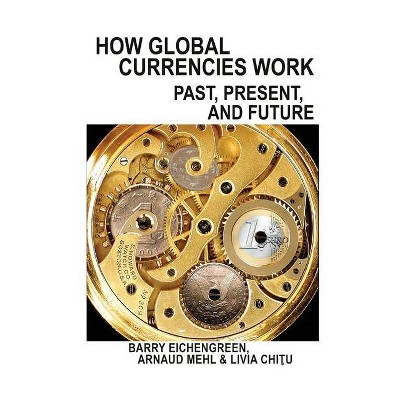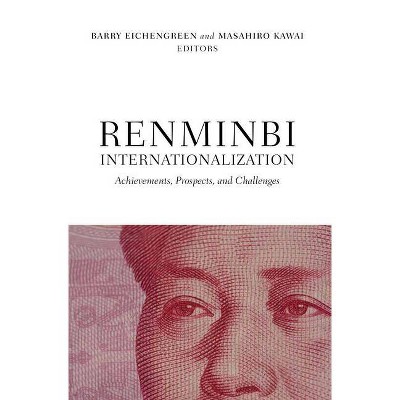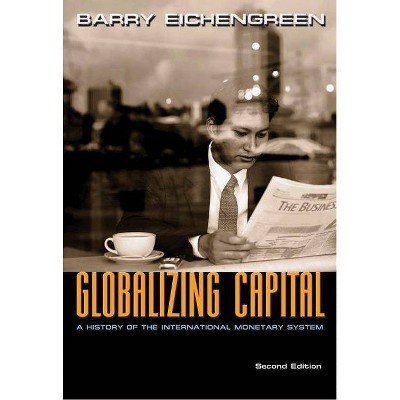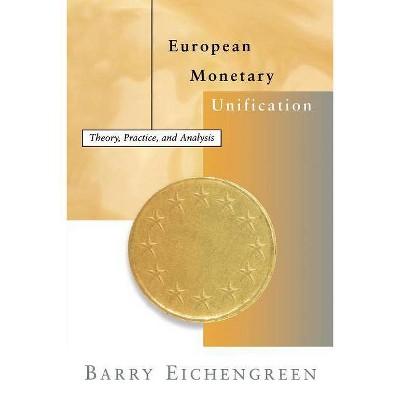How Global Currencies Work - by Barry Eichengreen & Arnaud Mehl & Livia Chitu (Hardcover)
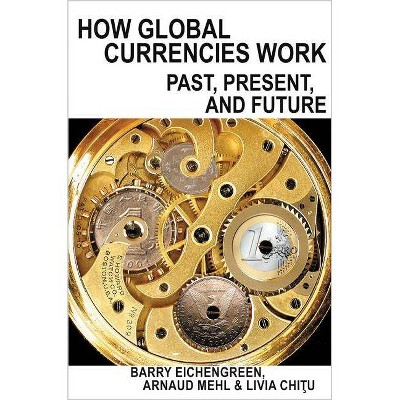
Similar Products
Products of same category from the store
AllProduct info
<p/><br></br><p><b> Book Synopsis </b></p></br></br><p><b>A powerful new understanding of global currency trends, including the rise of the Chinese yuan</b> <p/>At first glance, the modern history of the global economic system seems to support the long-held view that the leading world power's currency--the British pound, the U.S. dollar, and perhaps someday the Chinese yuan--invariably dominates international trade and finance. In <i>How Global Currencies Work</i>, three noted economists provide a reassessment of this history and the theories behind the conventional wisdom. <p/>Offering a new history of global finance over the past two centuries, and marshaling extensive new data to test established theories of how global currencies work, Barry Eichengreen, Arnaud Mehl, and Livia Chiţu argue for a new view, in which several national monies can share international currency status, and their importance can change rapidly. They demonstrate how changes in technology and in the structure of international trade and finance have reshaped the landscape of international currencies so that several international financial standards can coexist. They show that multiple international and reserve currencies have in fact coexisted in the past--upending the traditional view of the British pound's dominance prior to 1945 and the U.S. dollar's dominance more recently. <p/>Looking forward, the book tackles the implications of this new framework for major questions facing the future of the international monetary system, from whether the euro and the Chinese yuan might address their respective challenges and perhaps rival the dollar, to how increased currency competition might affect global financial stability.</p><p/><br></br><p><b> From the Back Cover </b></p></br></br><p>"This book will come to be known as the one that challenged the old, winner-takes-all view of international currency competition and established the new view. Barry Eichengreen and his coauthors present thorough and telling evidence that the historical reality is that multiple currencies play consequential roles in international trade and finance--and that lock-in effects and persistence are not as strong as traditionally assumed. In short, this is a must-read for all economists interested in international macroeconomics and finance."<b>--Richard Baldwin, Graduate Institute of International and Development Studies, Geneva</b></p><p>"Barry Eichengreen, our pre-eminent international monetary historian, and his coauthors have written a great book around the central theme that there have almost always been multiple rival international currencies and that the advantages of being the world's lead currency are not as marked as traditionally argued. The book is lucidly written, eschewing mathematical technicalities, though the background scholarship is deeply impressive. It should be read by everyone interested in the monetary history of the past two centuries."<b>--Charles Goodhart, London School of Economics and Political Science</b></p><p>"This eloquent and learned book will become the standard--perhaps one should say the gold standard--for discussions of international currency regimes, and for the analysis of the uncertainties that accompany changing global leadership."<b>--Harold James, Princeton University</b></p><p>"The authors put the plural back into global currencies, for good reason. As their historical but highly topical research establishes, there can be more than one global (or 'reserve') currency at any one time, as has often been the case in the modern world. This is an important corrective to the recurring oversold yen then euro then yuan will rival the dollar litany. But it is also a reminder that there is more to a stable global financial system than how many currencies there are, but how the leaders of those currencies take responsibility and interact."<b>Adam S. Posen, President, Peterson Institute for International Economics</b></p><p>"Drawing on new data, this book provides a rich contextual and historical analysis of reserve currencies in the global economy. This is very welcome, indeed."<b>--Sebastian Edwards, University of California, Los Angeles</b></p><p/><br></br><p><b> Review Quotes </b></p></br></br><br>The authors conclude that the euro, in particular, will play a more consequential role in international reserves relative to the US dollar, while China's renminbi will be slower to achieve acceptance.<b>---Ian McLennan, <i>Spear's Magazine</i></b><br><br>This volume offers a thrilling history of global finance over the past two centuries. It is very well written, marshals extensive new data and provides fascinating new insight into how global currencies work.<b>---Ivo Maes, <i>History of Economic Ideas</i></b><br><br><i>How Global Currencies Work</i> is an ambitious title that delivers fascinating analysis on the rise and fall of international currencies in the 20th century with some educated suggestions about their trajectories in the 21st.<b>---Christopher Smart, <i>Project Syndicate</i></b><br><br>A readable and timely book.-- "Finance & Development"<br><br>The book gives readers an excellent introduction to the history of international reserve currencies over the past two centuries. . . . For those involved, whether at a national or international level, in government or in financial institutions, it will make compulsory reading.<b>---Richard Parlour, <i>Central Banking Journal</i></b><br><p/><br></br><p><b> About the Author </b></p></br></br><b>Barry Eichengreen</b> is the George C. Pardee and Helen N. Pardee Professor of Economics and Political Science at the University of California, Berkeley. His books include <i>Hall of Mirrors</i>, <i>Exorbitant Privilege</i>, <i>Globalizing Capital</i>, and <i>The European Economy since 1945</i>. <b>Arnaud Mehl</b> is principal economist at the European Central Bank. <b>Livia Chiţu</b> is an economist at the European Central Bank.
Price History
Cheapest price in the interval: 39.5 on November 8, 2021
Most expensive price in the interval: 39.5 on December 20, 2021
Price Archive shows prices from various stores, lets you see history and find the cheapest. There is no actual sale on the website. For all support, inquiry and suggestion messages communication@pricearchive.us
